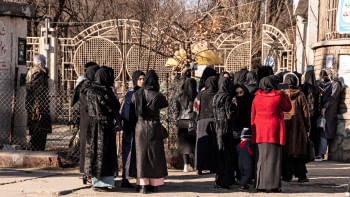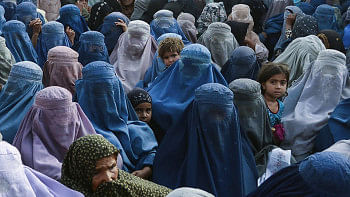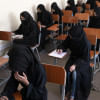Yet another assault on Afghan women

It is disappointing to witness the Taliban government continuing to backtrack on the promises it had made after taking over Afghanistan last year. In the latest breach, and not entirely surprisingly, we may add, the higher education ministry of the government has slapped a ban on university education of women, on top of the existing ban on girls attending secondary school, which has been in effect since March. While the latter decision was defended using a number of flaky excuses, the university ban, we're told, has been imposed to preserve "national interest" as well as women's "honour." But how can holding back one half of the population and their progress through education be in Afghanistan's interest?
It's no secret that the Taliban government is dealing with a serious, multi-faceted economic crisis at the moment, with it largely cut off from international trade and aid over the past year. For a country that used to receive USD 4 billion of foreign aid annually, as per OECD data, this blow has been especially devastating. One of the biggest factors behind the government's failure to be officially recognised as legitimate rulers of Afghanistan is its regressive policies relating to women.
As such, we must ask: what really drove the Taliban to impose the latest ban on women's tertiary education? What can they possibly expect to gain from this in realistic terms? And how does it help address their crises at the moment? More fundamentally, do such regressive policies at all align with the Islamic Sharia law that the Taliban claim to be following? Let's not forget, it is partly because of such policies and practices that Afghanistan became vulnerable to foreign interventions in the first place.
In the last 20 years, the Afghan people have seen the ugliest faces of war, and the lives of generations of people have been ruined. Women, in particular, have had to claw their way up to gain access to education and employment opportunities. Now, all that is at risk of disappearing, with the Taliban continuing to restrict women to the four walls of their homes, detached from everything else. This cannot be the attitude of a government looking to receive support from the international community.
The Taliban must realise that to advance the interests of Afghan people, it needs to invest in education for women – not ban it. This will not only help the government build better relations with other countries and earn public support at home, but will also help Afghanistan reach its potential as a nation. In this regard, the international community must play a strong role in holding the Taliban to its own promises and pressurising it to deliver. As a country that was once ravaged by war and built itself up from its ashes, we want Afghanistan to rebuild itself for its own good.


 For all latest news, follow The Daily Star's Google News channel.
For all latest news, follow The Daily Star's Google News channel. 







Comments